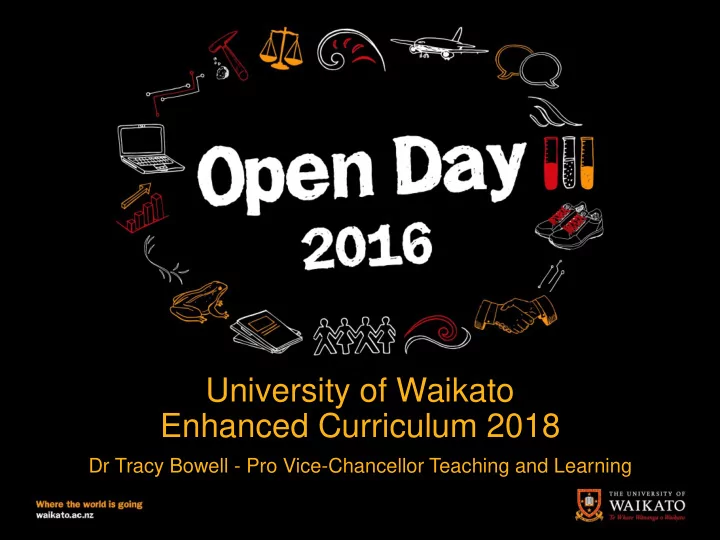

University of Waikato Enhanced Curriculum 2018 Dr Tracy Bowell - Pro Vice-Chancellor Teaching and Learning 1
Modernising Our Curriculum Curriculum Enhancement Project began 2014 Delivered Curriculum Design Framework • Identifies a set of University-wide graduate attributes • Lays down principles for curriculum design • Sets out structures for undergraduate degrees Currently at implementation stage • Planning revised and new undergraduate degrees to align with principles and structures • Deciding how to revise our majors so that they align with principles 2
University of Waikato Graduate Attributes • Apply discipline-specific knowledge and concepts to professional practice and in everyday practical contexts. Application of discipline- • Appreciation of how discipline-specific knowledges intersect, creating new spaces of (and profession-) specific enquiry and new ways of understanding the world. knowledge • (Where relevant) demonstrate professional competence and to meet the technical standards of their profession. • Assemble, analyse, synthesise and evaluate information in systematic and creative Application of critical ways, making connections across fields of knowledge, and identifying solutions to thinking in systematic, challenges in familiar and unfamiliar contexts. innovative and creative • Knowledge of current and emerging research methodologies in particular disciplines, ways and the ability to apply these in systematic and innovative ways. • Engage effectively and critically with technology-enabled information, data and tools. • Communicate clearly in a variety of oral, written and digital formats to a variety of specialist and non-specialist audiences. Effective communication • Contribute effectively to collaborative tasks and projects. and collaboration • Cross-cultural communication and for working constructively with diverse groups and individuals. • Communicate effectively in culturally and linguistically diverse contexts. Competent in culturally • Integrate Māori and indigenous perspectives in the contexts of disciplinary knowledges. diverse local and global • Grasp and apply disciplinary knowledges from within local and global perspectives. contexts • Adherence to the ethical standards of the discipline and the profession (where relevant). Professional and • Capacity for self-reflection and ongoing learning. personal integrity • Ability to apply knowledge and skills for the wider benefit of society locally, regionally, nationally and globally. 3
Principles Our degrees will be Delivery will be more simple and flexible flexible Increased opportunities for online-learning, more blended Curriculum will be learning, up-to-date pedagogies future-oriented Designed to prepare graduates for multiple roles and for roles that don’t yet exist Curriculum will be designed to produce work-ready graduates - Breadth and depth of content/professional knowledge, skills and expertise - Understanding of their discipline within a broader interdisciplinary context Development of employment-relevant skills – team-work, project work, self-direction, - time-management, digital literacy, numeracy, intercultural competence - Work-integrated learning 4
ELECTIVES DISCIPLINARY CULTURAL FOUNDATIONS PERSPECTIVES DEGREE MAJOR(S) SPECIFIED INDUSTRY, EMPLOYER AND COMMUNITY ENGAGEMENT ELECTIVES 5
Points Values for Papers 3-year degrees will comprise 360 credit points (no change) 4-year degrees will comprise 480 credit points (no change) All papers will become 15 point papers Consequence: Students take 4 papers per semester in each year of study (with exception of summer semesters) 6
The Degrees Comprehensive • General qualifications not leading to recognition by a particular professional body. • All four-year qualifications will become Honours degrees Professional • Qualifications leading to recognition by a particular professional body • Engineering, Environmental Planning, Law, Social Work, Teaching
Comprehensive Degrees Faculty of Arts and Faculty of Computing Social Sciences and Mathematical Sciences Bachelor of Arts Bachelor of Computing and Mathematical Sciences – 4 Bachelor of Media and year Honours Creative Technologies Bachelor of Science Bachelor of Social Sciences Bachelor of Design (new) Bachelor of Music
Comprehensive Degrees Faculty of Education Faculty of Management Bachelor of Business Bachelor of Education Analysis Bachelor of Studies (new) Communication Studies Bachelor of Sport and Bachelor of Business Leisure Studies Enterprise (new) Bachelor of Management Studies – 4 year Honours
Comprehensive Degrees School of M ā ori and Faculty of Science and Engineering Pacific Studies Bachelor of Arts with Majors: Bachelor of Science Māori and Indigenous Studies (new) Bachelor of Applied Science (new, offered in Tauranga)
Professional Degrees Faculty of Arts and Faculty of Law Social Sciences Bachelor of Laws Bachelor of Social Work Bachelor of Environmental Planning Faculty of Science and Engineering Faculty of Education Bachelor of Engineering Bachelor of Teaching
Our Timelines All revised/new From 2018 all first and second degrees offered year (100, 200 level papers) from 2018 worth 15 credit points From 2019 all third year papers (300 level) worth 15 credit points Consequences: Papers required for majors will be Class of 2017 slightly different Students will continue to take 4 Students will complete first year papers in each semester of study under existing regulations and Students will be able to take then transition to new Industry, Employer and qualification Community Engagement papers 12
New Initiative for High Schools Expansion of UniStart programme We will offer our first year papers to high school students More opportunities to complete papers online No fees payable by students, no STAR funding required from schools Discretionary entry to approved applicants Work in partnership with schools to provide learner support, etc. 13
Thank you for listening Do you have any questions, comments, suggestions? 14
15
Recommend
More recommend